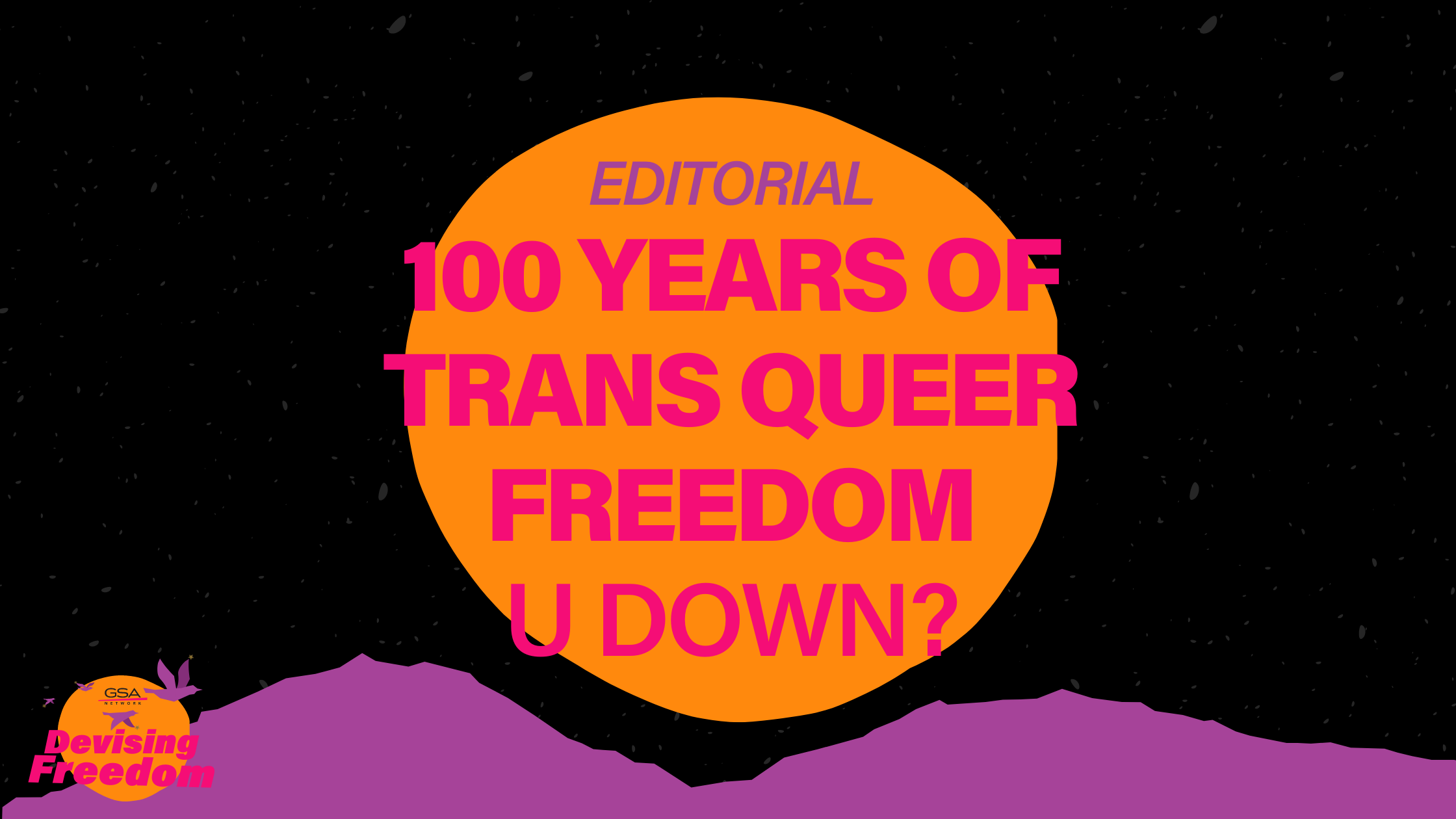
By J. Gia Loving, GSA Network Deputy Director
I wonder what it would feel like to grow up in a world where queerness is something more than other or different. For trans and queer youth today, the choice to live authentically continues to have a clear and escalating cost. While we organize toward acceptance, access, and protection under law, I wish I knew how it would feel to be free.¹
It feels like hunting season
This moment, which feels like chaos—ongoing pandemic, war, targeted legislation—is connected to a long history of powerful people creating the idea of an “other.” By scheming an illusion of who needs to be controlled and who should do the controlling, powerholders spark infighting and keep the gates of their authority secure. After 50 years of LGBT movement-building, US lawmakers continue their hunt and kill game, and one of their many targets is on the backs of trans and queer young people.
For the third consecutive year, state lawmakers are introducing legislation and guidances that directly threaten the lives of trans and queer youth. Some governors have requested state social workers investigate families of trans youth and encouraged citizens to report their neighbors. State legislators have introduced and passed bills that censure school curriculum and criminalize educators who affirm LGBT students.
…and this year’s legislative session is just getting started. In 2021, nearly 150 of these bills were introduced, focusing on preventing trans athletes from playing sports and criminalizing health care providers for providing care to trans youth. In 2020, legislators took aim at public restrooms and tried to limit the places trans people are allowed to pee.
What time is it on the clock of the world?²
The conservative right’s decades-long campaign to eliminate queerness (otherness) strategically leaves trans and queer people of all ages feeling isolated, silenced, exhausted, and hopeless. Powerholders want us to believe that after 50 years of anti-LGBT laws, queers would be less queer. Trans youth would be less trans. Yet, in the worlds of Miss Major, “[We’re] still f-cking here.” State laws won’t stop trans and queer youth from existing.
Grace Lee Bogg’s question “what time is it on the clock of the world?” reminds us that each of us gets to be part of making the future. In the way that the conservative right learns and builds upon momentum, we must look back at our past and find strength. Queerness, for so long, has been understood to be “other-ness,” something to confess. What if inside our queerness is the magic…the energy…the type of love…the strategy…the practice that can show us how freedom feels? I think it’s time we find out.
Queerness as home, as change, as freedom.
Home. Home is a starting place; earth, womb, arms, house, safety net, holiday spot, return, restart. For many trans and queer people, our queerness, or even the early feelings of being different, starts our relationship with home in question. Will I lose my home if I speak my truth? Does who I am determine if I deserve a home, a starting place? Must I choose: home or me?
These questions would sound different if trans and queer youth were taught that everyone deserves a solid starting place. These questions would sound different if all people were taught that each of our bodies, hearts, spirits are our home. Trans and queer youth often must learn this on our own. We sink into ourselves until our spirit comes up for air. Then like magic, some trans and queer people find each other. We create community and build home. When we love people who love us, we can try to give ourselves the starting place we have always deserved.
Change. As young people, we are taught the world’s limits and the consequences of testing those limits. In the United States, the edges of our boxes/cages/cells are enforced punitively, by punishment. The challenging of cultural norms is ancient anxiety of those in authority, especially when crowd control is core to power control. When authority draws a line, and anything outside the line is deemed bad/other/queer, we’re set up to lose. To be punished.
Queerness is often the feeling of potential for change. Even when young people are not given all the options, or when they’re told some options are untouchable, the feeling of potential—of something that is possible, missing, needed, out there—remains. Queerness is the journey of holding on to this impossibility and refusing anything less than the possibility. Queerness teaches us that change is not something to be feared. Change is the only lasting truth and queerness teaches us that binaries are lines of shifting sand.
Freedom. The United States has enforced the idea that safety requires a sacrifice of freedom. US authority has made it clear that in order to not be the focus of a beating, one must move out of the way. In this way, the United States enforces authority, misnamed as democracy, in the name of freedom. To protect American power, we’re expected to practice unfreedom.
Movements for social justice have dug their way toward the entrance of the establishment. Movements have fought for acceptance and access. Where are we? Do we have access to the power, the killing-power, that is currently getting ready to go to war?
The freedom our queerness teaches us is not about the ability to be openly LGBT while at the top of a power structure that defines its purpose as maintaining power by practices of unfreedom.
Queerness refuses unfreedom. Queer freedom is to honor my past, current, and future, and that of others, and that of this world. Queer freedom is shifting our commitment from hoarding power by way of unfreedom towards finding the power in everyone’s choice to be.
We’re devising [trans queer] freedom³. U down?
From what I read about queerness in 1922, underground and undercover, we still found each other. One hundred years later, in 2022, quarantined and under attack, we’re still reaching for each other. We’re choosing life. We’re coming home. We’re telling our truth. We’re sustaining our spirit. And we’re star-gayzing. One hundred years of trans and queer freedom, u down?
¹Listen “I Wish I Knew How It Would Feel to be Free.” Nine Simone, 1967
²Grace Lee Boggs’ question to organizers
³See “Devising Freedom: Notes on the Work of Radical Imagination.” RJ Macconi
